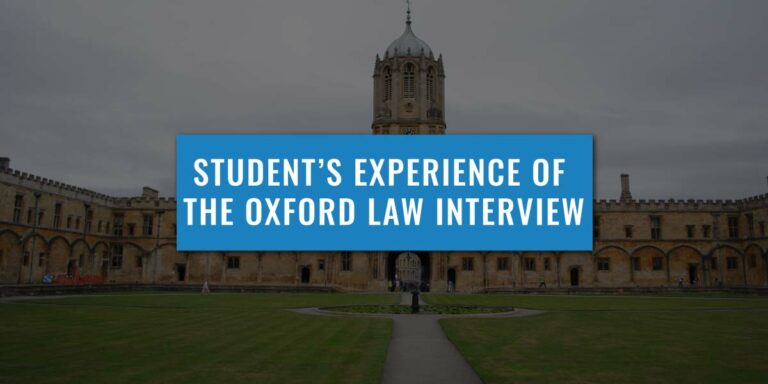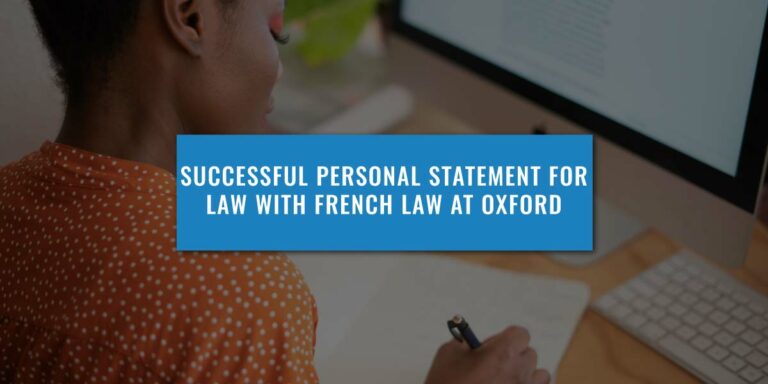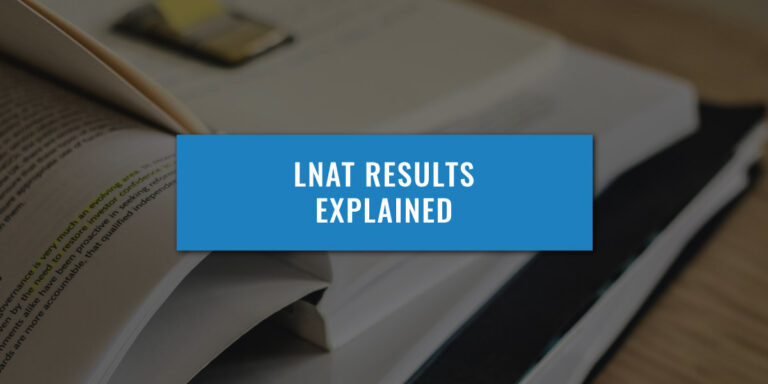If you’re looking to study Law in the UK, you may be considering a university in London. As the UK’s biggest city, it houses 22 unique universities that teach the standard Law (LLB) degree, more than anywhere else in the country.
With so many options to choose from, it will take a lot of time to thoroughly research them all, so this guide was designed as a starting point to help you get an understanding of each of these universities. Read on if you want to learn more about the Law schools in London and which one is the best.
Law Schools In London
As stated, there are 22 unique universities that teach the standard Law degree in London. These are as follows:
London Law Schools
- London Southbank University
- Middlesex University
- Northeastern University London
- Queen Mary, University of London
- University of Roehampton
- School of Oriental and African Studies (SOAS)
- St. Mary's University, Twickenham
- University College London (UCL)
- The University of Law
- University of Westminster
- University of West London
Some of these universities are incredibly famous globally, while others were only established in the last twenty years. They are all unique from one another and have different strengths and weaknesses, but they are all viable options for your education.
There are other Law degrees available at most of these universities which cover different specialities or subject combinations. However, for this guide, we’ll just be focussing on the standard M100 (UCAS Code) Law degree, as well as any extended variants of the course.
How To Choose Your Law School
Before we begin, let’s consider how you should actually go about choosing your Law school. There are many different factors to consider, but the most important thing is to not make your decision on a single element. Instead, you should consider all the pros and cons of each university and decide if everything balances out.
Important things to consider include:
Location
Do you want to be located in Central London or further out of the city?
Entry Requirements
Will you realistically meet the entry requirements for the university?
Acceptance Rates
How many students are admitted each year (this information is, unfortunately, hard to find for most of these universities).
Course Length
Most standard courses last three years, but are you interested in completing a foundation year or a placement year?
Rankings
There are multiple university ranking tables available, with the two most popular being Complete University Guide and The Guardian. Rankings can be helpful, but these aren’t objective placements so should be taken with a grain of salt. Our guide to UK Law Rankings explains this further.
Course Content
Law degrees all teach roughly the same content, but the presentation and structure of this content will be different between universities. Does this university teach the content in a way that appeals to you? Plus, Law degrees each have a unique selection of optional modules. If you want to study a specific topic in Law (e.g. Media Law, Environmental Law), be sure to check which universities offer it, as not every module is taught at every Law School.
Assessment
Again, most universities assess Law in similar ways, but some may focus more on written assessments and others on course work. What suits you more?
Facilities
Does the university have good facilities for Law students? Things to look out for include mock courtrooms, access to a Legal Clinic and dedicated Law librarys.
Qualification
This should be standard with every UK Law degree, but always ensure that training for the Solicitors Qualifying Examinations (SQE), Bar Professional Training Cours (BPTC) or both, is highlighted on the course page, as this will be essential for your career development.
From this list, take the factors that matter to you and consider if a certain university matches your expectations. If you find an option that meets all of your needs and is somewhere that you could feasibly be admitted to, then that may be the one for you.
Law National Aptitude Test (LNAT)
In the UK, most law degrees do not require you to sit an entrance exam/admissions test. However, a standardised test for Law applicants has been developed and is used by nine universities in the UK. This is the LNAT and needs to be booked independently in order to take.
The LNAT tests applicants on their verbal reasoning, information interpretation and deductive reasoning skills within two separate sections. It’s a hard test to prepare for, but doing well in it can help improve your chances at certain Law schools in London. We have highlighted which ones require or accept the LNAT in this guide.
With all of this out of the way, it’s time to take a look at all of the Law schools located in London from A – Z.
Boost your Law application and get your place with UniAdmissions
Law is an incredibly popular degree in the UK, and it can be difficult to get admitted to some Law Schools. At UniAdmissions, we have spent over a decade refining our preparation resources and teaching methods, helping more students gain admission to Law courses than any other school.
Discover our Law Full-Blue Programme below and find out how you can enrol and triple your chances of success.
Anglia Ruskin University London Law
- Established Date: 1858
- Complete University Guide Ranking: 95th
- The Guardian Ranking: 93rd
- Course Length: 3/5 Years
- UCAS Tariff Requirement: 96 Points
- GCSE Requirement: 3 GCSES 4+ including English
- LNAT: No
Anglia Ruskin University London is the first Law school on our list and is one of the easier ones to get into. With a UCAS Tariff requirement of just 96 points, gaining entry to this degree may not be too difficult.
The follows a standard three-year structure that starts students with the fundamentals of law before covering a variety of different areas of the field. Modules covered include Contract and Criminal Law in Year One, Tort Law, Business Law, Medical Law and Commercial Law in Year Two and Property Law, Employment Law and different forms of Litigation in Year Three. Year Two also includes industry work experience.
Year Three features a major project, while assessments regularly take place each year, including traditional exams, essays, mooting, presentations and group work.
Anglia Ruskin does not exclusively teach in London, as it also has campuses in Cambridge, Peterborough where Law is taught. A four-year version of the course is available, which includes a foundation year prior to standard teaching.
Anglia Ruskin also teaches a fully online Law degree, which teaches the same modules and offers the same qualifications over three or five years. This course is significantly cheaper than the standard course with a full fee of just £15,900.
Birkbeck, University of London Law
- Established Date: 1858
- Complete University Guide Ranking: NA
- The Guardian Ranking: NA
- Course Length: 3/4 Years
- UCAS Tariff Requirement: 112 Tariff points (3 Year), 48 points (4 year)
- GCSE Requirement: 3 GCSES 4+ including English
- LNAT: No
Birkbeck is one of several London Law schools associated with the University of London, located near Mayfair. The university actually stands as the second-oldest university on this list, being established in 1823 in the Crown and Anchor Tavern. The university also made history by becoming one of the first colleges to admit female students – even before both Oxford and Cambridge.
Regarding the university’s law offering. The three-year degree offered has a fairly standard entry requirement of 112 UCAS Tariff Points, although a four-year foundation degree is also available with a reduced requirement of 48 points. Although the reason is not known, this university is not featured on either major university ranking table.
Standard Law topics are taught via lectures and seminars, including Contract Law, Criminal Law, Legal Systems, Land Law, EU Law, Jurisprudence and Trusts Law. These are all compulsory, but over 30 optional modules are also available to pick from in Years Two and Three. The four-year degree spreads the modules from Year One across two years.
The university also highlights the inclusion of Pathways for Law, which allows students to further specialise in Commercial Law, Legal Practice and Human Rights. These can also be applied to separately from the standard Law degree.
Brunel University Law

- Established Date: 1966
- Complete University Guide Ranking: 46th
- The Guardian Ranking: 97th
- Course Length: 3/4 Years
- A-Level Entry Requirements: AAB - BBB
- IB Entry Requirements: 30 points (English SL 5 or HL4 and Maths SL 4 or HL 4)
- UCAS Tariff Requirements: 120 Points
- LNAT?: No
As well as housing one of London’s six medical schools, Brunel University – located in Uxbridge – also teaches Law as both a standard degree and a variety of specialised degrees. The standard Law degree is available as a three-year degree or a four-year degree including a full placement year.
The entry requirements for Brunel as fairly standard, with offers requiring between BBB and AAB, or 30 IB points. However, UCAS Tariff points are also accepted, with 120 being required for entry. Looking at the ranking placements, we can see a 50-point difference between the two tables, with Complete University Guide placing it in the top 50 Law schools in the UK for 2024.
Within the three years of standard study, students are taught compulsory modules for the first two years, including Criminal Justice, Civil Justice, Public Law, Tort Law, Land Law, Law of Equity and EU Law. Academic and Professional Development is also emphasised in these two years, alongside the Foundations of Legal Research. This is in preparation for Year Three, in which each student must complete a dissertation as well as choose 4 – 5 different optional modules to study.
Modules are taught through lectures and seminars and students will be assessed through standard examinations, written coursework, presentations and more. For those completing a placement, the university has a dedicated placement team available to support them in their search.
City, University of London Law
- Established Date: 1894
- Complete University Guide Ranking: 54th
- The Guardian Ranking: 56th
- Course Length: 3 Years
- A-Level Entry Requirements: ABB
- UCAS Tariff Requirement: 128 Tariff Points
- GCSE Requirement: GCSE Maths and English Grade 4+
- LNAT: No
City is another member institute of the University of London, joining recently in 2016 over 100 years after its establishment. Located in Northampton Square near Pentonville, the university offers a single three-year Law degree that places an emphasis on practice experience.
Entry requirements are on the higher-end, requiring ABB or 128 UCAS Tariff points (although lower contextual offers are available). There are no specific subject requirements for your A-Levels, though other qualifications, such as T-Levels, are required to be in a relevant subject, including Science, Legal, Finance, Accounting or Management.
The structure of the course is fairly standard, teaching fundamentals in Year One including the English Legal System, Legal Analysis, Law in Practice, and Contract/Criminal/Public Law. Year Two offers a wider range of modules to choose from, ranging from Mediation to International Law and Technology. In Year Three, Students can continue with their course as normal to select more optional modules.
However, City also offers specialisms in Commercial Law, International Law, Human Rights, Professional Practice and Technology, one of which can be selected at the end of Year Two. This gives students to graduate with a more specialised degree. Third-year students can also choose to spend part of the year studying abroad as part of a student exchange programme. Countries available include Australia, Singapore, France, Italy and Turkey.
Though teaching is generally taught via lectures, seminars and tutorials, additional activities like mooting competitions and shadowing opportunities are also available for students. Scheduled learning is said to make up between 15% and 24% of a student’s time depending on the year of study, with the rest being covered by independent learning. Assessment is split between written examination and coursework, with Year Two having an 80% focus on the former.
University of East London Law
- Established Date: 1898
- Complete University Guide Ranking: 100th
- The Guardian Ranking: 89th
- Course Length: 3/4 Years
- UCAS Tariff Requirement: 112 Tariff Points
- GCSE Requirement: GCSE Maths and English Grade 4+
- LNAT: No
The University of East London’s Law School, located in Stratford, can range from three to five years with an optional foundation year and placement year. Entry requirements are fairly standard, requiring 112 UCAS Tariff Points.
Modules throughout the foundation year and Year One cover legal foundations, including Legal Communications, Constitution, Research Methods, Legal Skills, and more. Year Two covers more specific topics, including Criminal Law, Tort Law and EU Law, as well as a module dedicated to effective career development. The placement year between Years Two and Three, where students can find work at a relevant company. Year Three offers students the choice between a variety of optional modules, ranging from Employment Law to Banking Law and Brexit.
It is stated that each student will have a dedicated personal tutor to support them throughout their studies. Teaching is done via lectures, seminars, workshops and individual supervision to support you with your independent study. Students are assessed via coursework and exams, as well as an individual research project in their final year.
Access "The Oxbridge Application Vault"
- 300+ page ebook for Oxbridge Applicants
- 25 page ebook for Personal Statement
- 2h+ online course to succeed in any exam
- Online Oxbridge Success Calculator
- 12 page ebook about UniAdmissions

Goldsmiths, University of London Law
- Established Date: 1890
- Complete University Guide Ranking: 96th
- The Guardian Ranking: NA
- Course Length: 3 Years
- A-Level Entry Requirements: ABB
- IB Requirement: 33 (with 655 at Higher Level)
- LNAT: No
Goldsmiths, another member of the University of London, offers a standard Law degree and speciality degrees in Criminal Justice and Politics, as well as a joint Economics and Law degree. Applicants are required to achieve ABB in their A-Levels, with alternative requirements including 33 on the IB with 655 at Higher Level and DDD in a relevant BTEC. UCAS Tariff Points are not considered.
Despite its low placement on the Complete University Guide’s Law ranking table, Goldsmith’s was rated 6th for student satisfaction, the second highest in London.
The course lasts three years, with students moving from foundation subjects like Criminal Law and Contract Law to a wide variety of optional modules covering AI, Art Law, Immigration Law and more. Two exclusive modules available in Year Two are The Goldsmiths Project and The Goldsmiths Elective which offer research opportunities and cross-disciplinary work.
Teaching is done via lectures, seminars and independent learning, as well as “more modern and diverse teaching styles” that integrate new technologies. Mooting and debating are also emphasised, as well as a variety of activities supported by other university departments. Student assessments depend on the module, with coursework, examinations, case notes, reports and more all being utilised, as well as a final-year dissertation.
University of Greenwich Law
- Established Date: 1890
- Complete University Guide Ranking: 56th
- The Guardian Ranking: 79th
- Course Length: 3/4 Years
- UCAS Tariff Requirement: 128 Tariff points (3 Year), 64 points (4 year)
- GCSE Requirement: GCSE Maths and English Grade 4+
- LNAT: No
The University of Greenwich offers a variety of Law degrees for both undergraduates and postgraduates, including an Extended degree that includes an additional foundation year for students. The standard Law degree has higher than average entry requirements (128 UCAS Tariff Points), though contextual offers are also available that can reduce this by up to 16 points.
Across the three years of the standard course, students will work through ten compulsory modules ranging from Public Law to Criminal Law and Jurisprudence. In Year Three a single compulsory module (Equity and Trusts) is taught alongside three optional modules that the student must choose. These cover Competition Law, IP Law, Family Law, Medical Law and more.
Beyond traditional teaching and assessment methods, students have access to many helpful connections, including links to the “magic circle” law firms and chances to assist volunteer lawyers in actual cases. Guest talks and networking events are also frequently held.
King's College London Law
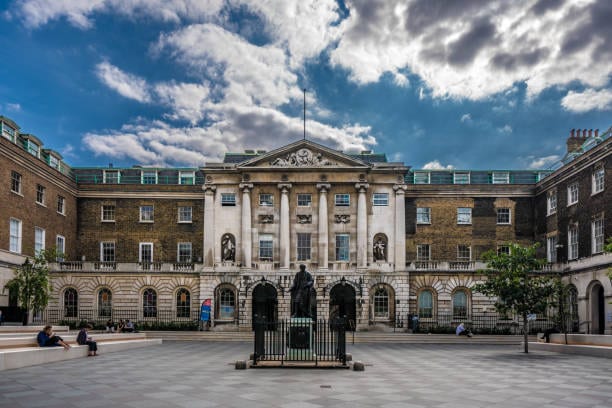
- Established Date: 1829
- Complete University Guide Ranking: 5th
- The Guardian Ranking: 7th
- Acceptance Rate: 16.7%
- Course Length: 3 Years
- A-Level Entry Requirements: A*AA
- IB Requirement: 38 Points
- LNAT: Yes
With campuses located at both Waterloo and on the Strand, King’s College London (KCL) is one of the city’s most famous and competitive universities. With an offer rate of just 16.7% (2023) and consistent placements in the top ten UK Law schools, it’s not surprising to see that entry requirements are much higher than most other Law degrees (A*AA at A-Level of 38 points at IB).
As well as this, KCL is the first university on this list to utilise the LNAT in its application process. As mentioned before, the LNAT is an admissions test designed to test applicants on important skills required to excel in Law. Although no specific score is required to be considered, you will need to ensure you get a high score to remain competitive and earn your offer among the 4,000+ applicants. Also, be aware that contextual offers can lower the entry requirement to AAB or 35 IB points.
As for the course itself, the university states that it “focuses on the study of law as an intellectual discipline”. KCL boasts some of the most highly regarded teaching in the UK, with frequent visits from renowned professionals and experts for students to speak with. Although the first year is the same for all students, second-year students have to option to move into multiple dual degrees, such as American Law and Hong Kong Law, or study abroad for a year.
First-year students will learn about Criminal Law, Public Law, European Law, Contract Law and Legal Reasoning. After that, mobile may change based on the choice of a dual degree, but compulsory modules include Proper, Tort and Trusts Law, as well as a selection of optional modules, of which students can choose one or two. In the final year, the only compulsory module is Jurisprudence and Legal Theory, while optional modules range from Anti-Discrimination Law to Criminal Law Theory and Criminology.
Teaching is conducted through a mixture of Lectures, Seminars and Small Group Tutorials, while assessment is conducted via written exams, coursework and essays, although moots and negotiation exercises are also used.
Kingston University Law
- Established Date: 1899
- Complete University Guide Ranking: 64th
- The Guardian Ranking: 58th
- Course Length: 3/4 Years
- UCAS Tariff Requirement: 120 - 136 Points
- GCSE Requirement: 5 GCSEs Grade 4+ including Maths and English
- LNAT: No
Kingston University offers three different Law degrees: Law, Law and Criminal Justice and International Law. The standard Law degree is taught for three years with the option for an additional placement or study abroad year within the course.
Entry requirements are higher than average, with a standard offer requiring 120 – 136 UCAS Tariff Points or a Level 3 BTEC at DDM.
Students are taught via standard methods, though students will have access to a dedicated person tutor upon their arrival at the university. Years One and Two consist of mostly compulsory modules, including English legal Systems, Tort Law, Public Law, Land Law, Criminal Law, Contract Law and EU Law. In Year Two, applicants will need to choose between Commercial Law and International & Comparative Law as an optional module.
In the final year, there are two compulsory modules (Law in Context and Equity & Trusts), along with a selection of optional modules, of which students must pick two.
London Metropolitan University Law
- Established Date: 1895
- Complete University Guide Ranking: 88th
- The Guardian Ranking: 49th
- Course Length: 3 Years
- A-Level Requirements: BBC
- UCAS Tariff Requirement: 112 Points
- GCSE Requirement: GCSEs Maths and English Grade 4+
- LNAT: No
The London Metropolitan University Law School, located North of Islington, offers a wide variety of opportunities for students, including access to a mock courtroom and group mentoring sessions with Clyde & Co and the East London Business Alliance.
Entry requirements for the course aren’t too high, with an A-Level requirement of BBC/112 UCAS Tariff Points.
The course features a wide variety of compulsory modules in Years One and Two, including Administrative Law, Constitutional Law, Tort Law, Legal Method and more, many of which are taught over two parts across the two years. Year Two introduces a selection of optional modules, including Law of Evidence, Consumer Rights Laws and Advocacy & Mooting. Year Three also features several compulsory modules, such as Civil Law and Criminal Litigation, but also provides new optional options like Child Law, Civil Liberties, Entertainment Law and Environmental Law.
Teaching methods vary depending on the modules, but students are assessed via case studies, essays, examinations, oral presentations and research projects.
LSE Law

- Established Date: 1899
- Complete University Guide Ranking: 3rd
- The Guardian Ranking: 4th
- Acceptance Rate: 6%
- Course Length: 3 Years
- A-Level Entry Requirements: A*AA
- IB Requirement: 38 Points (with 766 at Higher Level)
- LNAT: Yes (Section A only)
The London School of Economics (LSE) is one of four G5 universities that teach Law and only one of two located in London. Being a part of the G5 University Group, as well as the Russell Group, means that the reputation and teaching standards at this university are higher than most others in the country. With ranking placements of 3rd and 4th in 2024, it’s clear the reputation is well earned.
This esteem is reflected in the entry requirements, where applicants must achieve A*AA in their A-Levels or 38 in the IB with 766 at Higher Level. Applicants also need to complete the LNAT, although only Section A is considered. If you’re hoping to study at LSE, you’ll need to be prepared to be among the very best of the application pool, as only 6% of the 2,600+ applicants in 2023 were admitted on to the course.
As for the course itself, LSE states that the course is taught from a “social science perspective”, something unique to the university. It is also one of the UK’s top legal research institutions, so students will be in a great position to contribute to this work.
Across the three years of teaching, students will move from standard topics like Public Law, Criminal Law and Contract Law in Year One through to a range of optional modules in Year Two and Three. First-year students will also take part in The LSE Course, an interdisciplinary course available to all LSE students.
LSE teaches with lectures and small classes, although seminars are sometimes used too. It’s stated that students will complete at least one assessment per term, though these are for monitoring purposes and do not count towards final grades. The final degree is awarded based on performance in the second and third years, including annual examinations and essay tasks.
Earn your place at your dream Law school with support from UniAdmissions
Law degrees can be incredibly competitive and tough to get a place on, especially in London. You’ll need to demonstrate your ability and your dedication to the field through your Personal Statement, LNAT and interview. UniAdmissions can support you through every step of the application process with help from our team of expert Law students and graduates.
Discover our Law Full-Blue Programme below and find out how you can enrol and triple your chances of success.
London South Bank University Law

- Established Date: 1892
- Complete University Guide Ranking: 83rd
- The Guardian Ranking: 54th
- Course Length: 3 Years
- UCAS Tariff Point Requirement: 112 Points
- LNAT: No
Located on Borough Road, this Central London university offers multiple pathways for law, including Business Law and Criminal Law. However, the main pathway is unique in the UK as the first course to offer a Clinic Guarantee, which ensures all students get to experience learning within a Law Clinic that offers them real-world legal experience with the public.
Entry requirements for the course aren’t too high, with a minimum UCAS Tariff Point requirement of 112.
The initial Semesters of the course teach standard topics like Legal Skills, Public Law, Tort Law and Criminal Law, as well as the ‘Working in the Law’ module which facilitates time in the aforementioned Legal Clinic. After this, different module option pools are made available for the remaining semesters, covering a broad range of relevant topics.
South Bank’s teaching style is described as ‘experimental’ due to its emphasis on placements, simulations and professional skills exercises. Standard class teaching is also present, but these practical activities are more prominent than in many other Law schools. Assessments are conducted via written exams, multiple-choice quizzes, cause work, group work and presentations, testing a broad range of skills and knowledge.
Middlesex University Law
- Established Date: 1973
- Complete University Guide Ranking: 85th
- The Guardian Ranking: 70th
- Course Length: 3 Years
- A-Level Requirements: BBC - BBB
- UCAS Tariff Requirement: 112 - 128 Points
- GCSE Requirement: GCSE English Grade 4+
- LNAT: No
Middlesex University London offers a fairly standard London Law degree, with A-Level requirements ranging from BBC to BBB (or 112 – 128 UCAS Tariff Points). The course is taught over three years, during which students learn about the English Legal System, Legal Skills and various kinds of Law.
In Years Two and Three, a number of optional modules are introduced, including EU Law, Theories of International Relations, Alternative Dispute Resolution, Evidence, Global Trade Law and much more.
Teaching is roughly split 1:4 guided learning vs independent learning, though this varies between the three years. Teaching methods vary from seminars to workshops and lectures. Students also have the option to study abroad for a year, which extends the course to four years. The course is primarily assessed via exams and coursework.
Northeastern University London Law
- Established Date: 2011
- Complete University Guide Ranking: NA
- The Guardian Ranking: NA
- Course Length: 3 Years
- A-Level Requirements: AAB
- IB Requirement: 38 Points (with 665 at Higher Level)
- LNAT: No
Northeastern University London is the youngest Law School in London, being established in 2011. Located by the Tower of London, the university boasts an emphasis on core subject study, with a major focus placed on Competition Law, Contract Law, Constitutional Law, Criminal Law, Property Law and Tort Law.
Also unique to this university is the Flexible Electives Courses, which take a more American approach to university study and allow applicants to choose Discipline studies in a variety of other subjects, like Business, Computer Science, Economics, History, PPE and more. Thematic Pathways are also available based on Sustainability and Technology & Ethics. This allows for around 30% of the course content to be personalised.
The entry requirements for this degree are slightly higher than average, with a minimum A-Level performance of AAB or at least 35 points for IB (or 665 for Higher Level).
Queen Mary, University of London Law

- Established Date: 1785
- Complete University Guide Ranking: 14th
- The Guardian Ranking: 12th
- Course Length: 3 Years
- A-Level Requirements: A*AA
- IB Requirements: 36 (with 666 at Higher Level)
- GCSE Requirement: 6 GCSEs at 777766, including English and Maths
- LNAT: No
Queen Mary is the oldest university in London to offer Law, with a history dating back as far as 1785. However, the university was known as the London Hospital Medical College at the time before evolving into Queen Mary College in 1934 and the School of Law established in 1965. However, it remains one of the highest-rated universities in London and is a member of the University of London.
The Law degree on offer at Queen Mary is fairly popular, receiving over 2150 application in 2022. The entry requirements for the course are comparatively high, requiring applicants to achieve A*AA at A-Level or 36 at IB with 666 at Higher Level. However, the LNAT is not required. Bear In mind that contextual offers can be made that lower the requirements as far as ABB.
The course features six compulsory modules in Year One, ranging from Public Law, to Land Law and two separate Contract Law modules. In the following years, compulsory modules include Criminal Law, Tort Law, Jurisprudence and Equity & Trusts. Meanwhile, students will choose one or two additional modules from a wide selection including Criminology, Revenue Law, Medical Negligence Law, Media Law and more. These are split between full modules and half modules.
The university states students receive roughly 12 hours of contact time per week, including lectures and tutorials. Resources like the Law Library, Legal Advice Centre and Student Support officers are available to support students with independent study. Students are assessed with written exams, presentations, essays and coursework, as well as a final year dissertation.
University of Roehampton Law
- Established Date: 2004
- Complete University Guide Ranking: 66th
- The Guardian Ranking: 100th
- Course Length: 3/4 Years
- UCAS Tariff Point Requirements: 120 Points (3 Years), 64 Points (4 Years)
- GCSE Requirements: Grade 4 English and Maths
- LNAT: No
The University of Roehampton, located Southwest of Central London, is a fairly new university, being founded in 2004. Its Law degree can be taken over three of four years, with the later including an initial Foundation Year. The entry requirements for the standard degree at 112 – 120 UCAS Tariff Points, while the four year course requires just 64 points.
The course teaches mandatory modules covering Legal Systems, Ethics & Skills, Public Law and Law in Practice, as well as optional areas of study like Family Law, Public International Law, Medical Law and more. Learning is conducted in face-to-face classes while assessed through projects, exercises and exams.
As well as the Foundation Year, the option of a placement year is also available for students, which offers a chance to learn through practical experience for a full year. Other pro-bono placements are also available during standard study.
SOAS Law
- Established Date: 1916
- Complete University Guide Ranking: 34th
- The Guardian Ranking: 76th
- Course Length: 3 Years
- A-Level Requirements: AAA
- IB Requirements: 36 Points with 666 at Higher Level
- LNAT: Optional (required if taking a BTEC)
The School of Oriental and African Studies (SOAS) is a more specialised university than most others on this list, but it offers a standard LLB Law degree. It’s also a member of the University of London and has the highest entry requirements of the group (AAA at A-Level, 36 at IB with 666 Higher Level). A contextual offer of ABB/32 (655) is available.
The content of the course is similar to other London Law schools, focussing on essential models like Criminal Law, Contract Law and Property Law in Year One. From Year Two, all students study Legal Systems in Asia and Africa, a unique feature of SOAS Law School. As well as this, multiple optional modules are available in Islamic Law, as well as modules relating to Gender Law, Slavery and Immigration Law.
Teaching is conducted via lectures and tutorials, with more time spent independently studying. This includes completing the Independent Study Project (ISP) in the final year, which is similar to a dissertation.
St Mary’s University, Twickenham Law
- Established Date: 1850
- Complete University Guide Ranking: 72nd
- The Guardian Ranking: 69th
- Course Length: 3 Years
- UCAS Tariff Point Requirements: 96 - 112 Points Points
- GCSE Requirements: Grade 4 English and Maths
- LNAT: No
At St Mary’s University, located in Twickenham, practical experience is emphasised within the Law course, which boasts simulated legal exercises, a moot course, pro-bono initiatives and much more. UCAS Tariff Point requirements range from 96 to 112, which is on the lower end for London Law Schools and may require as low as CCC at A-Levels.
In Year One, core topics include Public Law, Criminal Law, Legal Skills and the English Legal System. All modules I Year Two are mandatory, including Tort Law, EU Law and Contract Law, but students have multiple options to select from in Year Three, including Employment Law, Insurance Law and Law in Sports.
16% of teaching is provided via contact time, which is delivered via lectures, seminars, workshops and tutorials. Students are expected to regularly collaborate with peers outside of standard teaching time to work on projects together. A wide variety of assessment methods are used, including written exams, reports, logs, presentations and essays, including a major essay task in the final year.
UCL Law
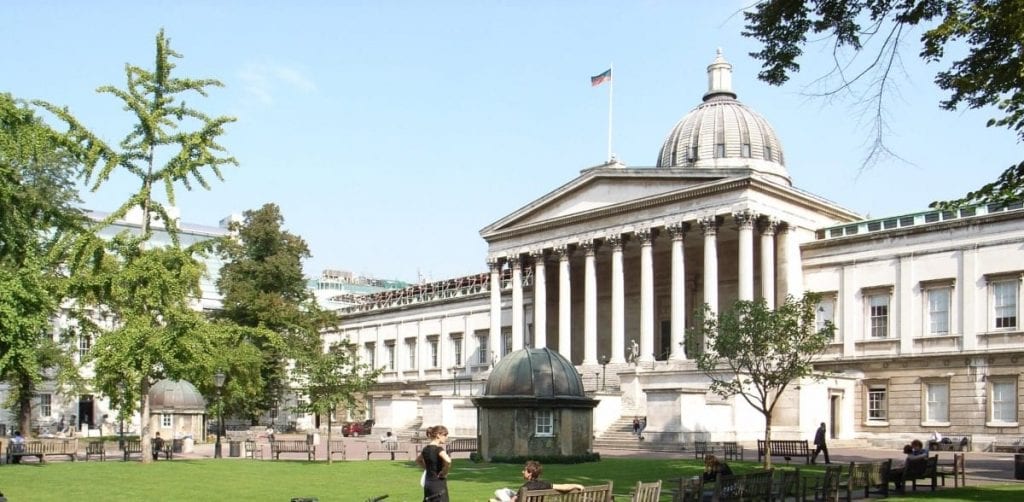
- Established Date: 1826
- Complete University Guide Ranking: 2nd
- The Guardian Ranking: 2nd
- Acceptance Rate: 3.9%
- A-Level Entry Requirements: A*AA
- IB Entry Requirements: 39 Points with 19 Points at Higher Level (none below 5 Points)
- GCSE Entry Requirements: Grade 6 in English and Maths
- LNAT?: Yes
University College London, better known as UCL, is another G5 University and is arguably the most popular university in London. The university ranked 2nd on both ranking tables, even rivalling the Oxbridge universities for the title of best Law School in the UK. UCL teaches a very broad range of subjects, including Law, which can be studied in multiple different countries alongside UK Law (e.g. German Law, French Law). An additional year can also be spent studying abroad in America, Australia, Hong Kong or Singapore.
Gaining admission into UCL is one of the most difficult out of all the London universities, with only a 3.9% success rate among applicants in 2024 (out of over 5,000 applicants). Applicants must achieve A*AA in their A-Levels or 39 Points in their IB (including 19 points at Higher Level). Contextual offers of AAB/36 Points are available though. Two of your qualifications must be included in UCL’s list of preferred A-Level subjects. The LNAT is also required, though no minimum score is set.
Life studying UCL Law starts with a two-week induction module known as the Laws’ Connections: Legal Doctrine and Contemporary Challenges. This offers the foundations of Law and will help students with everything that comes after. Year One consists of four other compulsory modules: Contract Law, Criminal Law, Property Law and Public Law.
In Year Two, you will complete four more compulsory modules, including Jurisprudence, Tort Law, EU Law and more on Property Law. Year Three allows students to choose from over 20 modules, including Animal Justice, History of English Law, Environmental Law, Health Care Law, Roman Law, Unjust Enrichment and more. One of these modules will be the basis of your final-year research project.
Teaching is conducted via lectures, seminars, tutorial groups and independent study. In the first two years, students can expect at least ten hours of contact time each week. Written assessments are the primary testing methods, but students are also assessed on group work and presentations.
The university of Law
The University of Law is unique on this list as it isn’t a singular university as the other London Universities are. Although some universities have multiple campuses and others are members of various groups or establishments (such as the University of London), the University of Law is a singular brand that runs 20 different campuses in the UK and abroad.
Of these campuses, three are located in London including a collaboration with Royal Holloway, University of London (though only Postgraduate courses are taught here). The campus at Moorgate is also exclusive to graduates, so the Bloomsbury campus is the only one that offers the standard LLB degree, as well as an accelerated variant (which is only two years of study) and an optional foundation year. Online study is also available.
Life studying UCL Law starts with a two-week induction module known as the Laws’ Connections: Legal Doctrine and Contemporary Challenges. This offers the foundations of Law and will help students with everything that comes after. Year One consists of four other compulsory modules: Contract Law, Criminal Law, Property Law and Public Law.
However, looking at the course content, everything covered seems very standard. First-year students should expect to learn about Legal Method, Ethics, Contract Law, Public Law, Criminal Law and Tort Law. After that, compulsory modules include Business Law, Land Law, Current Legal Issues and Equity & Trusts. In Years Two and Three, a variety of optional modules are made available, including EU Law, Real Estate, Employment Law, Wills, Litigation and Civil Dispute Resolution.
Exclusive to the London campus are two modes relating to Canadian Law, which cover foundations and Constitutional Law. Other modules include more general topics like employment skills and practical tasks like and Extended Essay.
The university boasts small class sizes and flexible study options for students as well as access to a specialised careers service, including pro bono clinics. Assessments are done through exams, project reports, essays and presentations.
It’s important to note that, for international students, studying in the London Campus will be more expensive, costing £17,550 annually compared to £16,700 per year for any other campus.
University of Westminster Law
- Established Date: 1838
- Complete University Guide Ranking: 63rd
- The Guardian Ranking: 72nd
- Course Length: 3/4 Years
- A-Level Requirements: BBC
- UCAS Tariff Point Requirements: 112 Points
- GCSE Requirements: Grade 4 English and Maths
- LNAT: No
Although called the University of Westminster, Law students will be studying on the Regent Street campus in Central London. The university has fairly low entry requirements compared to other universities in the area, requiring just 112 UCAS Tariff Points or BBC at A-Levels.
From the first year, students get the chance to choose the module they study, though some compulsory modules include Legal Systems, Private Law, Public Law and Criminal Law. All students will also undertake a guided project in this first year. In Year Two, students will undertake possession practice as well as studying Business Law and Property Law. Optional modules include Child Protection Law, Consumer Law, Law & Mental Health, Social Justice and Legal Psychology.
Students then have the chance to spend a year abroad at one of the university’s partner institutions. In Year Three, more professional practice and legal research are required for all students, while the rest of the modules are optional choices.
The university teaches via multiple methods, including seminars, interactive lectures, tutorials and one-to-one sessions. Roughly 20% of a student’s learning time is spent in scheduled hours. Assessment is primarily done through coursework (70% – 80%), while practical and written assessments are also implemented.
University of West London Law
- Established Date: 1860
- Complete University Guide Ranking: 79th
- The Guardian Ranking: 42nd
- Course Length: 3/4 Years
- A-Level Requirements: BBC
- UCAS Tariff Point Requirements: 112 - 128 Points (3 Years), 72 (4 years)
- GCSE Requirements: Grade 4 English and Maths
- LNAT: No
The final university on this list is the University of West London, located in Ealing. Applicants can apply for a three-year degree or a four-year degree with a foundation year, which has a reduced entry requirement. Applicants need to achieve between 112 and 128 UCAS Tariff Points to be admitted, or just 72 for the foundation degree. The university ranked 1st in London for overall student satisfaction in the National Student Survey 2024.
The university claims to offer a well-rounded education which includes pre-course support, multiple trips to legal locations and regular mooting competitions. Within the course content, students will learn standard topics in Year One such as Constitutional Law, Contract Law, Criminal Law, Public Law and more.
In Year Two, students will learn about Equity & Trusts, EU Law, Land Law, Property Law and Tort Law. Two optional modules are also available this year: Mooting & Advocacy and Legal Practice, Ethics & Regulation. Year Three does not feature any compulsory modules, so students will be able to all six of their topics. These include Evidence Law, Company Law IP Law, Sports Law and Immigration Law.
Conclusion
We’ve now learnt about all of the Law schools in London, but which one is the best? That depends on what you’re looking for. If you go by rankings, UCL is objectively the best London Law school in 2024 as it ranked 2nd on both lists. If you think the university with the highest entry requirements is the best, you could say LSE or Queen Mary is the best.
It all comes down to what you value from a university. Even the universities that rank the lower have merit, and all universities in the UK deliver a good standard of teaching. Attending the best possible Law school isn’t necessary to be successful, as all of these degrees lead to you earning your qualification to enter the profession.
How you spend your time at university and what you do with your knowledge and abilities after graduation will be what defines your success, so be sure to choose the university that will best help you unlock your potential.
No matter where you apply, we hope this guide has been a helpful starting point for your decision-making process. We’ve supported many students through their Law applications with our Law Full-Blue Programme.
Get your offer to study Law in London with UniAdmissions
With numerous steps involved in the Law application process and highly competitive acceptance rates, building confidence can be challenging. However, UniAdmissions is here to guide you through everything from your Personal Statement to the LNAT, equipping you with the skills needed for success!
Discover our Law Full-Blue Programme below and find out how you can enrol and triple your chances of success.



